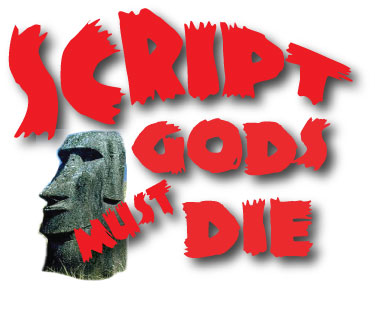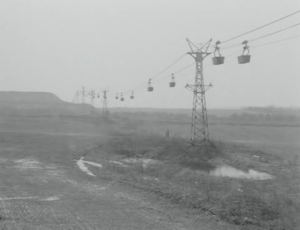Script Gods Must Die is a screenwriting blog. For six years now we’ve worked the usual suspects– structure, format, character and story development, dialogue… but sometimes the best dialogue are the lines you don’t write. Film as visual medium gives preeminence to the camera image. The 30+ years of silent movies proved, like they said in Sunset Boulevard, “we didn’t need dialogue, we had faces.”
I’ll never forget the first time I saw Bella Tarr’s Damnation. Forced perspective out a widow looking over the s——l—–o—–w passing on gondola cars along a cable wire. We didn’t cut and the shot went on…and on……….and on. We finally pulled back to see a couple making love, but that one shot went on for five minutes and the movie’s tone, location and freaking depression were already establish without a single line of dialogue. I was like, wait a minute, how can you hold on a single shot that long? I had never seen that before because I had never seen a Bella Tarr movie. He should be a revelation for any screenwriter– how much you can get done without dialogue, the poetry captured in the image. I found clips from his movies (no scripts available) so here’s a sampling of the otherworldly Tarr. Please check his flicks out to see what can be done with minimal dialogue. Here’s his bio…
Béla Tarr (born 21 July 1955) is an acclaimed Hungarian film director. Much of his work is marked by philosophical elements and a pessimistic view of humanity. His films utilize unconventional storytelling methods, such as long takes and/or non-professional actors to achieve realism.
Debuting with his film Family Nest in 1979, Tarr underwent a period of what he refers to as “social cinema”, aimed at telling mundane stories about ordinary people, often in the style of cinema vérité. Over the next decade, the cinematography of Tarr’s films gradually changed; Damnation (1988) was shot with languid camera movement aimed at establishing ambience. It marked Tarr’s earliest experimentation with philosophical themes, focused mostly on bleak and desolate representations of reality. Sátántangó (1994) and Werckmeister Harmonies (2000) continued this approach; both are considered by some critics to be among the greatest films ever made. Tarr would later compete in the 2007 Cannes Film Festival with his film The Man From London.
Frequent collaborators of Tarr include his wife Ágnes Hranitzky, novelist László Krasznahorkai, film composer Mihály Víg, cinematographer Fred Kelemen, and actress Erika Bók. After the release of his film The Turin Horse (2011), Tarr announced his definitive retirement from film direction. In February 2013 he started film school in Sarajevo, known as film.factory.–WIKIPEDIA
- DAMNATION
- SATANTANGO- GIRL WALKING WITH DEAD CAT
- WERCKMEISTER HARMONIES-BAR SCENE


